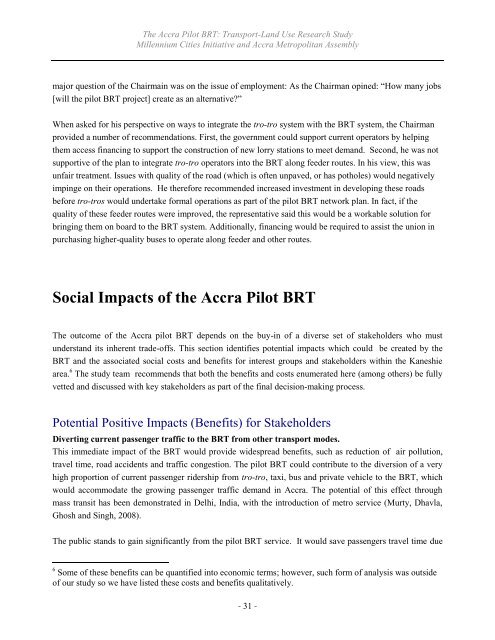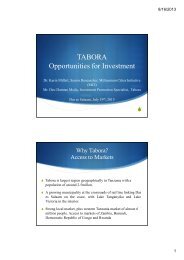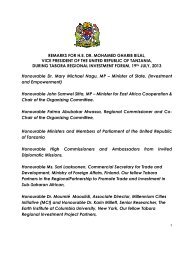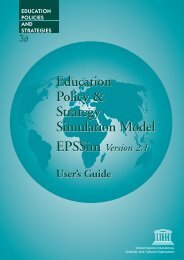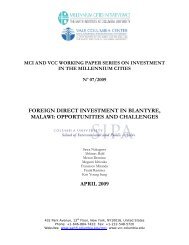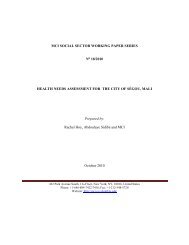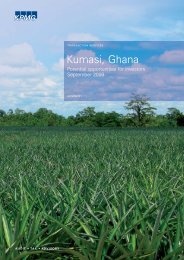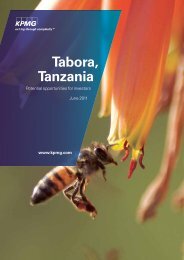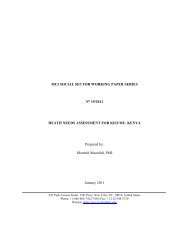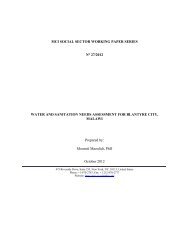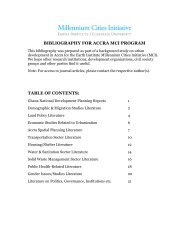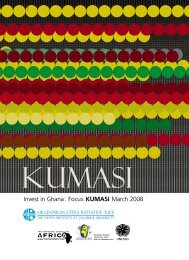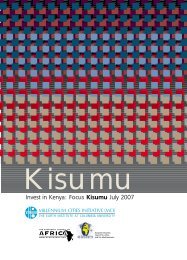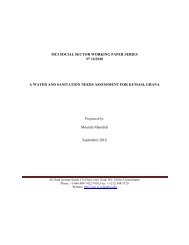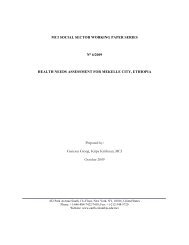Transport-Land Use Research Study - Millennium Cities Initiative ...
Transport-Land Use Research Study - Millennium Cities Initiative ...
Transport-Land Use Research Study - Millennium Cities Initiative ...
You also want an ePaper? Increase the reach of your titles
YUMPU automatically turns print PDFs into web optimized ePapers that Google loves.
The Accra Pilot BRT: <strong>Transport</strong>-<strong>Land</strong> <strong>Use</strong> <strong>Research</strong> <strong>Study</strong><br />
<strong>Millennium</strong> <strong>Cities</strong> <strong>Initiative</strong> and Accra Metropolitan Assembly<br />
major question of the Chairmain was on the issue of employment: As the Chairman opined: “How many jobs<br />
[will the pilot BRT project] create as an alternative?”<br />
When asked for his perspective on ways to integrate the tro-tro system with the BRT system, the Chairman<br />
provided a number of recommendations. First, the government could support current operators by helping<br />
them access financing to support the construction of new lorry stations to meet demand. Second, he was not<br />
supportive of the plan to integrate tro-tro operators into the BRT along feeder routes. In his view, this was<br />
unfair treatment. Issues with quality of the road (which is often unpaved, or has potholes) would negatively<br />
impinge on their operations. He therefore recommended increased investment in developing these roads<br />
before tro-tros would undertake formal operations as part of the pilot BRT network plan. In fact, if the<br />
quality of these feeder routes were improved, the representative said this would be a workable solution for<br />
bringing them on board to the BRT system. Additionally, financing would be required to assist the union in<br />
purchasing higher-quality buses to operate along feeder and other routes.<br />
Social Impacts of the Accra Pilot BRT<br />
The outcome of the Accra pilot BRT depends on the buy-in of a diverse set of stakeholders who must<br />
understand its inherent trade-offs. This section identifies potential impacts which could be created by the<br />
BRT and the associated social costs and benefits for interest groups and stakeholders within the Kaneshie<br />
area. 6 The study team recommends that both the benefits and costs enumerated here (among others) be fully<br />
vetted and discussed with key stakeholders as part of the final decision-making process.<br />
Potential Positive Impacts (Benefits) for Stakeholders<br />
Diverting current passenger traffic to the BRT from other transport modes.<br />
This immediate impact of the BRT would provide widespread benefits, such as reduction of air pollution,<br />
travel time, road accidents and traffic congestion. The pilot BRT could contribute to the diversion of a very<br />
high proportion of current passenger ridership from tro-tro, taxi, bus and private vehicle to the BRT, which<br />
would accommodate the growing passenger traffic demand in Accra. The potential of this effect through<br />
mass transit has been demonstrated in Delhi, India, with the introduction of metro service (Murty, Dhavla,<br />
Ghosh and Singh, 2008).<br />
The public stands to gain significantly from the pilot BRT service. It would save passengers travel time due<br />
6 Some of these benefits can be quantified into economic terms; however, such form of analysis was outside<br />
of our study so we have listed these costs and benefits qualitatively.<br />
- 31 -


